Thoughts on the Mac OS X Mountain Lion Developer Preview
by Andrew Cunningham & Anand Lal Shimpi on February 19, 2012 7:40 PM EST- Posted in
- Mountain Lion
- Mac
- macOS
General Impressions: The iPad-ification of the Mac
With Mountain Lion Apple officially drops the Mac prefix to the OS, it's now simply OS X 10.8. It's interesting (and perhaps deliberate?) that Apple keeps speaking of the updates in Lion/Mountain Lion as bringing iPad features to the Mac, not just iOS features. Perhaps that speaks to the nature of the convergence we'll see going forward.
There was a time in the microprocessor business where AMD and Intel felt that the ideal architecture for low power was mutually exclusive with the ideal architecture for high performance. Over time it became very evident that what makes you power efficient often gives you great performance as well. What we saw was a unification of mobile and desktop CPU architectures as a result. Although you could argue that the same sort of product bifurcation is happening now with the popularity of smartphone SoCs, I suspect we'll eventually see more convergence there in terms of features over time.
I do wonder whether we'll see a similar transformation in the OS space. Much of the discussion has been focused around bringing iOS user experience and features to OS X, however I'm more curious about whether we'll see a more fundamental merging of the two OSes over time. Today Apple has an i and an X line of operating systems, but what's to say that we won't see an eventual unification there. In many ways this would be a motivation for OS X on ARM, but it's a similar (and possibly a stronger) motivation for iOS on x86.
For this developer preview, the download and installation processes are identical to Lion - you still get the OS from the Mac App Store, it still creates a recovery partition for diagnostic and reinstallation purposes, and it still looks and acts mostly the same. If you made a USB or DVD installer for Lion from the App Store installer, that method continues to work here.
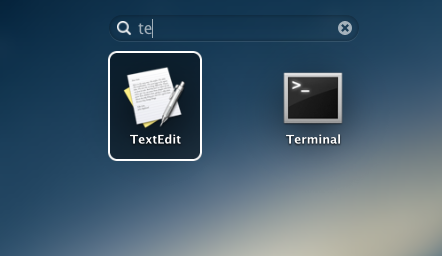
The Mountain Lion Finder, along with Lion additions like Launchpad and Mission Control, are at this point largely identical to their Lion counterparts. There are two obvious new features right now: first, Launchpad now includes a search box at the top of the window that lets you browse your installed apps. Compared to Spotlight, I find it to be of dubious usefulness, but I'm already on the record as finding the whole Launchpad concept to be of dubious usefulness - take my opinion as you will.
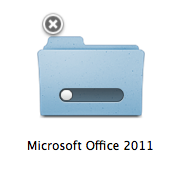
The other addition is also vaguely iOS-ish - you can cancel file copy operations in progress by clicking an X in the icon's upper left-hand corner (see above). Once a copy operation is complete, you delete the files by dragging them to the Trash just as before.
Safari 5.2
Safari 5.2, which is also currently available to developers as a beta for Lion, bumps the browser's WebKit version to 535.18.5, and brings with it some performance improvements and features. Features first: tabs now work as they do on the iPad, with each tab taking up an equal amount of space across the window - in Safari 5.1 and most other desktop browsers, new tabs are a fixed width (in both cases, the tabs begin to contract as you open more of them).
The address bar and search bar in the new Safari are also unified (as in Chrome and IE) - when you begin typing, the browser will search your default search engine, your bookmarks and history, and the content on the current page for matches. The Safari Reader button is now present to the right of the search/address bar at all times.
There's a new passwords manager in Safari that allows you to view and remove any stored user name/password combinations for websites you've visited. In the past this information was only accessible through the OS X Keychain but now it's available in both places.
Now, for performance - Safari 5.2 is measurably faster than Safari 5.1.3, and while it doesn't beat the latest stable versions of Firefox or Chrome in the tests below, the upgrade at least keeps Apple's default browser competitive. The problem is that this performance is a moving target - if Safari 5.2 doesn't launch before Mountain Lion's release this summer, both Mozilla and Google will have released several minor upgrades to their browsers that may help them pull even further ahead of Apple's latest. Interestingly enough the new Safari is actually faster than the latest stable build of Chrome in SunSpider but it loses everywhere else. Subjectively Safari feels fast but still not quite as fast as Chrome, although the two are much closer now.
These tests were run on a late 2010 MacBook Air, which runs a 1.6 GHz Core 2 Duo - please try to remember that before you laugh at any of these scores.
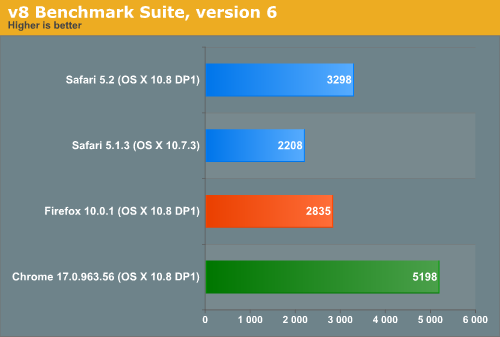
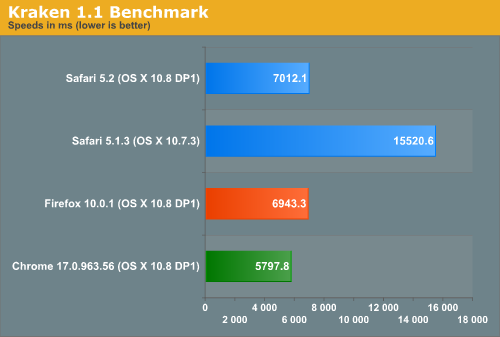
Apple Remote Desktop and Screen Sharing
The Apple Remote Desktop client in Mountain Lion has been updated to 3.6, which continues the years-long tradition of bumping the ARD version to support a new OS X release without adding enough fuctionality to justify a major version change. ARD gains IPv6 support and can now report information about batteries, trackpads, and Thunderbolt peripherals, but none of this fundamentally changes how the software works.
On a related note, Screen Sharing is made marginally more functional by the addition of controls at the top of the window - they don't really add anything that wasn't there, but they pull functionality that was previously hidden in menus and expose it to the user. Screen Sharing also supports drag-and-drop file sharing between connected computers, something previously limited to the full Apple Remote Desktop package.



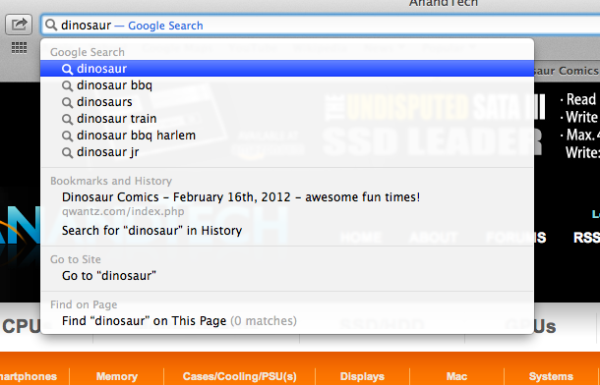
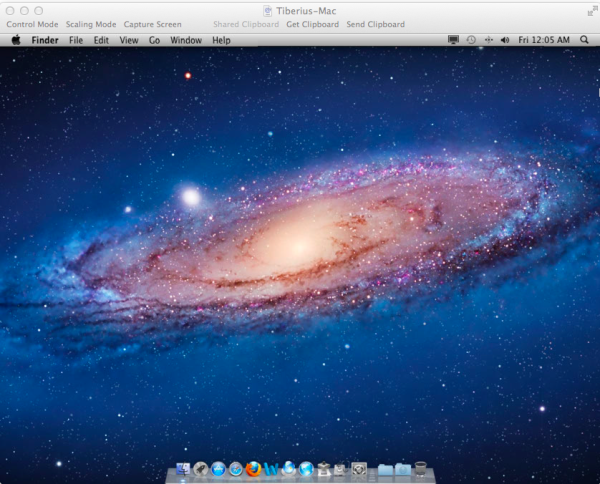








96 Comments
View All Comments
ananduser - Monday, February 20, 2012 - link
Your description fits W8 entirely.steven75 - Monday, February 20, 2012 - link
Or... Mountain Lion, since you CAN install apps from the internet willy-nilly or drop down to the terminal if you really want to.ananduser - Monday, February 20, 2012 - link
The Metro interface that W8 sports is much more dramatic than the effect some features from ios integrated in OSX might have.The Metro/Classic duality is also much more akin to ying/yang than the OSX interface which is technically a mash-up.
Scannall - Monday, February 20, 2012 - link
My mom is in her 70's. About a year and a half ago I finally talked her into ditching her Windows ME (Yes, the hated ME) computer. Got her a 27 inch iMac, transferred all her photos and other documents for her. And she has just been thrilled. She has since purchased an iPad 2 and an Apple TV box to go with it.And, since setting it up initially, she hasn't needed ANY tech support from me.
But for the more hard core, and those that like to tinker the Terminal program is still there, with all the command line goodness (Or destruction...).
Also, it's pretty easy to add either Windows and Linux to your iMac. I have both on mine. Most days anymore I just want to get things done, so I boot into OS X. On the days I feel like tinkering more there is Windows and Linux there for me to play with.
bji - Monday, February 20, 2012 - link
I had a similar experience with my 65 year old mother. After 10+ years of supporting her on Windows computers, I finally bought her a mac mini after her most recent Windows virus infection. It's been the smoothest 6 months of her computer life so far, and the amount of tech support I've had to provide has been much lower. She even figured out how to resize pictures and email them, on her own, something that for some reason after 10+ years of Windows use she still hand't figured out.This is just anecdotal evidence of course, and someone else's mother may find the Windows way of doing things comprehensible, but my mom didn't, and given how many similar comments I've read, I have a feeling there is something to Apple's UI design that works well for novice users.
As a software developer, I have no problem with Apple's approach, as long as they leave the door open for third party applications that don't go through their app store, which so far, they are.
I personally have never owned a Macintosh, but have alread set aside the money for a 15 inch Macbook Air, just waiting for them to come out. It will be nice to finally be able to port my software to OS X.
cyabud - Monday, February 20, 2012 - link
"I feel Apple as well as all others should provide a simple switch to disable to 'walled garden' "This switch you talk of is called Terminal.app
And I suppose on iOS it's called a jailbreak, but we're talking about OS X here.
solipsism - Monday, February 20, 2012 - link
Andrew and Anand describe the Gatekeeper controls in System Preferences and how you can bypass them at anytime by holding down a couple keys.Apple has no reason to force you to only buy Mac App Store apps otherwise they would not have offered code signing for external apps which make non-App Store apps safer. They also don't get so much profit from apps that it makes sense to limit to the number of potential Mac buyers.
Apple is by far the most profitable PC maker in the business and they plan to stay that way, hence their move to faster OS X updates and trying to make OS X as familiar as their more popular iOS platform without negatively impacting usability. So far they are doing a good job of it.
Conficio - Tuesday, February 21, 2012 - link
Terminal.app is not an open field (as opposed to a walled garden). It's more like the trenches of the [battle of the] somme.Really, while a terminal window is nice, the functionality it opens up is undocumented, unsupported and mostly hidden from view. and if you start the app from the terminal it still bitches about "being downloaded from ....", scaring the daylight out of "ordinary" users.
Really why I give credit to Apple to break the walled prisons of the cell phone carriers (mostly the US variety) on phones, they only did in order to replace it with their own walled garden. At least they allow different producers of the same kind of apps to compete, as they profit from all of them equally, where cell phone carriers pick and choose.
TEAMSWITCHER - Monday, February 20, 2012 - link
Just because you can buy the individual parts for a computer and assemble them doesn't make you an expert - you're more like a mechanic.Your entire argument is based on a false assumption, that Mac's are simple computers for simple people - a "walled garden". While that is true for those who like it that way, Mac's also include many high knowledge tools that Windows does not. Terminal provides access to these tools that have been a foundation for computers since the early Days of the C programming language and the UNIX operating system. Sorry, the MSDOS box is not even close to comparable.
Windows is more like a "Theme Park", you can ride all the attractions, but remember you are only a park visitor, and cannot go into areas marked "Authorized Personnel Only." They made damn sure of this by not providing the same tools that are included in each and every MAC OS X installation.
cjs150 - Monday, February 20, 2012 - link
Interesting comments to my post even if one (Tim) is obviously Mr Angry.I would not ask my 70+ year old mother to build a computer, I would buy her an Ipad because she does not need to understand how is works merely use it.
But my 10 year old needs to understand computers properly and best way is to start by making her build one (OS will probably by Linux). Maybe that makes her a mechanic (Teamswitcher) but it will also give her a better appreciation of how computers work.
Yes W8 worries me, it is supposed to be a more mature OS but looks like it was designed by someone whose only previous experience was an Ipad and kids cartoons.
The problem is that as the computing market matures a lot of assumptions are being made about how people should use the computer. I do not want someone else making assumptions about how I should work, what I want is the software to allow me to work the way I want to.
Please understand my original post was that the Apple philosphy does not work for me not that I hate Apple.